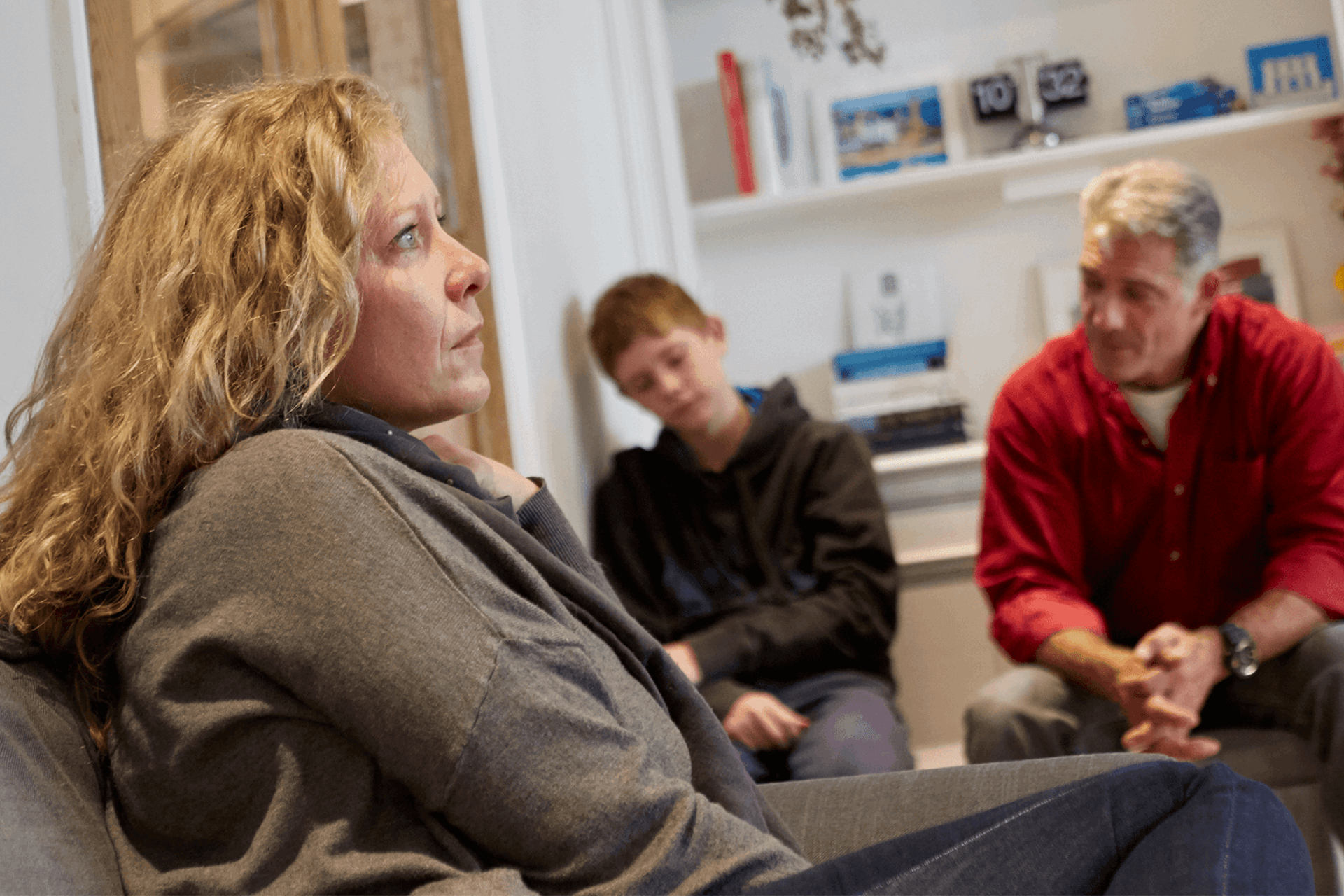If your child needs to stay in hospital to receive treatment for their mental health, this is sometimes called being in ‘inpatient care’.
If your child is in hospital, or is going into hospital soon, you may be feeling incredibly worried and upset. At the same time, it might feel like a relief to know your child is where they need to be to get help and feel better. However you’re feeling, remember that for lots of people, going into hospital is a key step in their recovery.
Navigating the hospital and different professionals involved in your child’s care can feel overwhelming sometimes. Here we answer questions about what will happen in hospital, how you can find information, raise questions or concerns, and how you can support your child.
I found having a child in inpatient care a very intense, stressful and frightening time. It doesn't mean your child will be 'fixed', but it can be a turning point.
How will my child get admitted to hospital?
In general, your child with either be admitted to hospital as an 'informal patient' or 'under section'.
If your child and the professionals supporting them both agree that it’s a good idea for them to go into hospital, and they are willing to go into hospital voluntarily, they will be known as an ‘informal patient’.
If you have a younger child who is not yet able to make their own decisions, you may be involved in deciding – together with the professionals supporting them – that they need to go to hospital. Depending on their age and individual situation, you may provide parental consent for them to be admitted as an informal patient.
As an informal patient, your child will be expected to take part in their treatment plan, but they have the right to refuse any treatment they do not want. They can also leave the hospital when they want to (although if you have a younger child, they may need to be accompanied or have permission to go out).
If your child wants to leave hospital but mental health professionals think they are too unwell to do so, they may consider whether to keep them in hospital using a law called the Mental Health Act. This is often called being ‘sectioned’.
If your child is ‘sectioned’ they have to go into hospital even if they disagree with the decision or do not want to. This is also known as being ‘detained’. Your child will only be sectioned if professionals think they are very unwell and need urgent treatment in hospital, and if your child is unwilling to go into hospital voluntarily. This often happens because professionals are worried your child could be a danger to themselves or someone else.
Before your child can be sectioned, a team of mental health professionals must assess them. This team usually includes an Approved Mental Health Professional (AMHP), such as a specialist social worker or nurse, and two doctors. At least one of these people should be an expert in child and adolescent mental health. If your child wants you to attend this assessment with them, the professionals should arrange for this to happen wherever possible.
The Mental Health Act (1983) is the law that gives mental health professionals the ability to section someone. The Mental Health Act sets out the different types of sectioning and your child’s rights under each one. You can have a look at our guide to find out what the different sections mean.
If you’d like to read more about how the Act works, you might find it useful to look at the Code of Practice. You can also use Mind’s legal glossary to find out what the different terms used in the Act mean.

What will happen during my child's time in hospital?
The hospital your child is placed in should be as close to their home as is reasonably possible, so that they can be as close to their family and friends as they can be.
When you arrive at the hospital, a member of staff will show your child around and help them to settle in. You can also look around the ward if you have travelled to hospital with your child. You and your child should be given some welcome information about how the hospital works.
This is a good time to ask the staff questions and find out what will happen next. You might want to ask about:
- what’s going to happen in the first few days
- what the rules of the ward are, including things your child is and is not allowed to have with them
- how you can stay in touch with your child, including the rules around them using their own phone and which staff member you can call to find out how they’re doing
- anything the staff could do to help your child feel more settled
- anything you’re particularly worried about
- how you will be involved in your child’s care and treatment
If you are not at the hospital with your child, you can ask to speak to a member of staff over the phone.
After being assessed, your child will be given a treatment plan, often referred to as their ‘care plan’. Your child’s treatment will be based on their individual needs and might include things like:
- individual therapy
- group therapy
- medication
- group activities
- occupational therapy
- family therapy
While your child is in hospital, their care will involve different professionals. Nurses will look after their day-to-day needs and they will have meetings with specialist doctors and other mental health professionals such as therapists. Our glossary for young people explains what each professional does.
The staff will try to make your child feels as included as possible in decisions made about them, and make sure that their views are listened to and respected wherever possible. They should also keep them fully informed about any changes to their care plan.
While your child is in hospital, they should be provided with education and educational support that is suitable and right for them. Hospital staff will speak to your child’s school or previous education provider to find out what their educational needs are and what work they need to do in hospital to continue their educational progress.
If they are well enough, your child can also sit any upcoming exams. Alternatively, they or you can speak to their school or college about delaying exams until the following year or taking a year out if needed.
I had so many questions all the time and sometimes I felt like a nuisance asking. Then I was reminded by a kind nurse that she expected me to forget things I'd been told. She encouraged me to come back and ask again any time. Don't be scared to ask questions, no one expects you to take it all in the first or even the third time.
How involved will I be in my child’s care and treatment?
The professionals at the hospital will try to work as collaboratively as possible with you and your child. This includes making time for regular conversations with you and arranging meetings at times when you are able to attend, if your child would like you to be there. You will also be able to regularly visit and speak to your child.
Navigating the way a hospital works and talking to professionals can feel overwhelming at times. Remember that you are still your child’s parent. You have important information and expertise that will be part of helping them get better.
The ways in which you are involved and the way decisions are made will depend on your child’s age, their own views on involving you in certain decisions, and the sort of treatment they’re being offered. This can sometimes feel like a very complicated area to get to grips with. If you’re feeling unsure about how you will be involved in your child’s care, get in touch with their care coordinator or ask another member of staff to talk it through with you.
These are some common questions parents and carers often have:
As with other types of mental health support, like seeing a counsellor or therapist, professionals will respect your child’s right to confidentiality, and there may be things your child does not want to share with you. Try not to take it personally if there are certain aspects of their care that they do not want to involve you in. Remember that having a private and independent space can sometimes be important. You can always speak to a member of staff to find out how confidentiality works and when it might be broken, for example if there is ever a concern about your child’s safety.
If your child does not want you to be involved in any part of their treatment, the professionals supporting them will explore this with them. They will usually try to encourage your child to involve you in some way, unless they think this is not in your child’s best interests.
The hospital should give you the name of a key worker or care coordinator who is responsible for overseeing the different parts of your child’s care. You can speak to this person when you need to find out information or have questions or concerns. If the hospital does not give you the name of this person, ask who they are and how you can contact them.
If your child is 16 or older, they have the right to make their own decisions about their treatment and how their information is shared – as long as the professionals supporting them feel they have the understanding and ability needed to do this. This is outlined in a law called the Mental Capacity Act, and is often referred to as having ‘capacity’. Professionals will assume that your child has capacity unless there is a clear reason why they may not.
If your child is under 16, a professional will assess them to determine whether they have enough maturity and intelligence to make a decision themselves, rather than assuming they do. This assessment is often referred to as ‘Gillick Competence.’
If professionals decide your child does not currently have ‘capacity’ or ‘competence’ to make a certain decision, you may be involved in making the decision together with the professionals supporting them.
If your child has been sectioned under the Mental Health Act, they will be assigned a ‘nearest relative’ – and this is likely to be you or their other parent. This is different to being ‘next of kin’. As a nearest relative, you have legal rights to be given information and be involved in certain decisions under the Mental Health Act. Find out more about your legal rights as a nearest relative, or speak to a staff member to ask for more information.
I realised that I was part of the inpatient team trying to help my daughter recover. I might not have had the clinical expertise that the inpatient team had, but I had to learn how I would care for my daughter when she came home. Realising this allowed me to get as involved as I could.
How can I support my child while they’re in hospital?
If your child’s stay in hospital is planned, think together about what they would like to take with them. If your child goes into hospital in an emergency, you may not have time to do this, but you can always bring things to the hospital later on.
It’s a good idea to take comfortable clothes and something to read, but think carefully before taking in anything valuable, and avoid taking in anything they wouldn’t want to get broken or lost.
Here are some ideas of things your child might like to take:
- comfy clothes
- pyjamas
- toiletries
- socks and underwear
- notebook or journal (not wirebound)
- colouring book
- playing cards
- wireless headphones
- sports clothes in case there are any opportunities for you to get active
- sleep mask
- ear plugs
- puzzle book
- their favourite cuddly toy
- flip-flops
- slippers
- photos
- blanket and pillow
- textbooks for school
Different units have different rules on which items are not allowed. This will usually include anything your child or someone else on the ward could use to harm themselves. You can speak to a member of staff to find out what the rules are.
You will be able to regularly visit and speak to your child while they’re in hospital. Speak to a member of staff about visiting times – there may be an allocated visiting slot each day, or it may work better to call ahead to arrange the times of your visits.
You can also stay in touch with your child by phone. If there are rules around if, when or how much your child can use their own phone, the hospital can provide you with an alternative, such as using a hospital phone or computer at an arranged time.
If it feels helpful, you may want to ask your child whether there are particular things they would like to do with you when you visit, or whether there’s a certain place they would like to sit with you. Your child’s ward will usually have a courtyard or garden where you can go together.
If your child’s doctor thinks they are well enough, you may also be allowed to take your child out of the hospital for a few hours, a day or a few days at a time. If your child is only allowed to leave the hospital for a short amount of time, you might want to think together about nearby places they would like to visit with you, such as a local park or another green space.
If your child has been sectioned, they will need written permission from the doctor in charge of their care to leave the hospital. This is often referred to as ‘section 17 leave’. To keep your child safe, your child’s doctor may decide that they need to be accompanied by a member of staff or are only allowed to go to certain places.
Your child may be feeling overwhelmed and want your support with speaking to professionals and making decisions, including having you attend meetings with them. If this is the case, you can ask the hospital to arrange meetings at a time when you are able to attend, and NHS guidelines suggest hospitals offer this flexibility.
You can also help your child to access advocacy services to support them in sharing their views.
The responsibility of caring for a suicidal child is immense. When I went to hospital, they handed over that responsibility to people who seemed more able to handle it. They also described feeling guilty for feeling relieved; they felt slightly like they were giving up as parents. But this was a part of parenthood that most parents don’t ever have to face.
Voicing your views, raising concerns and making complaints
If you are concerned about your child or an aspect of their care, talk to the professionals overseeing their treatment. You might be worried that the environment is not right for your child, disagree with something about their treatment plan or feel that your child is being discharged from hospital before they are ready.
When communicating your views to professionals, and asking for action to be taken, it helps to:
- Ask for a meeting or phone call with the different professionals involved in your child’s treatment, or with their care coordinator.
- Think through what you’d like to say and what you’d like the professionals to understand before you meet with them. Make a list of the questions you’d like answered and the topics you’d like to cover.
- Take a friend or family member to meetings, so that you feel supported and more able to say the things you need to.
- Take a notepad with you and take notes during meetings.
- Arrange a time when you will check-in again to see whether things have improved.
If you are feeling worried or unhappy about your child’s treatment and you don’t feel that the professionals supporting your child are taking enough action, you can contact your local PALS (patient advice liaison service) for confidential advice and support, and/or make a complaint following the steps below.
If your child is unhappy with their treatment and they are finding it difficult to express their views, or feel they are not being listened to, they might want to use an advocacy service.
Advocates are independent, trained support workers who will listen to your child and help them to understand their rights, express their views, raise concerns or complaints and participate in decisions about their care, including accompanying them to meetings.
In most situations, your child has the legal right to an Independent Mental Health Advocate (IMHA) if they have been sectioned under the Mental Health Act. This is an independent, statutory service, and your child must be provided with an IMHA if they ask for one. You can speak to a member of staff to find out whether your child qualifies for this support, and how to access the service.
Your child also has the right to an advocate if they are making a complaint about an NHS service. This is sometimes called ‘NHS complaints advocacy’. Your local area will have its own complaints advocacy service, which you can find by searching online, or contacting your local council or Healthwatch branch.
If your child would like advocacy support but they do not have the legal right to an advocate, you may still be able to access free advocacy through charities such as POhWER, The Advocacy People or VoiceAbility.
If you feel your child has been treated badly or unfairly, or you are not happy with the quality of their care, you or your child can make a complaint.
To do this:
- Find out how the hospital’s complaints process works, and follow this. If you can't find the process online, contact the hospital or their complaints department to ask for it.
- You can complain directly to the hospital or service you used, the commissioning group who paid for the service, or both. Find your local commissioning group’s website.
- Send your complaint and wait for a response. Your complaint should be acknowledged within three days, with details of what happens next. This information on the government website outlines what to expect when making a complaint about an NHS service.
- If you are not happy with the results of your complaint, you can contact the Parliamentary and Health Service Ombudsman.
If none of this works, you can write to your MP who can complain on your behalf. You can also get support from an advocate.
No one is more invested in your child's recovery than you. If you're not sure your child is getting the care they need; trust your instincts and ask for more help.
Supporting your child when they leave hospital
Getting ready for your child to be discharged from hospital might raise different feelings for you and your child. You might be feeling relieved that their doctors think they are now well enough to leave hospital or excited about having them back at home, but also nervous about how things will be and how your child will continue to be supported. It is normal to have some worries about this, and for things to sometimes feel a bit bumpy.
Before your child is discharged, a meeting will be arranged to outline how they will be cared for after leaving hospital, and you should be able to be involved in these discussions. What their care plan involves will depend on your child’s situation and the ongoing treatment they need.
Before leaving hospital you should:
- Have the name and contact details of the new main point of contact in the mental health service your child is being discharged to (usually Child and Adolescent Mental Health Services, known as CAMHS, or Adult Mental Health Services, known as AMHS). This person is often called a care coordinator or key worker.
- Have the name and contact details of your main contact point for any other services involved, such as a social worker.
- Be given dates for your child’s first appointment with the mental health team they are being discharged to, or a clear idea of what will happen in the first few weeks after they are discharged.
- Have a plan for what you should do if your child is in crisis after leaving hospital, including the professional to contact during a crisis. This is sometimes called a ‘crisis plan’.
- Have a plan for how your child will be supported to return to education if this is something they want to do.
It may be helpful to set up a meeting with your child and the professional who has been their key worker or care coordinator in hospital, if your child would like to do this. You can talk together about what has and hasn’t been helpful during their time in hospital, whether there’s anything they’re particularly worried about and how they would like to be supported at home.
After your child leaves hospital, try to:
- Ask them whether there’s anything in particular you could do to make them feel supported.
- Check-in with how they’re doing and how they’re finding things, while also giving them space to settle in and adjust when you can.
- Let them know they can talk to you whenever they need to, and that you don’t expect them to be fine all the time, or for everything to be okay.
- Spend quality time together when they feel able to. This could be watching a favourite TV programme or film, going for a walk together, having a kick-around or playing sport together, cooking or baking, or doing something creative like an adult colouring book.
- Make sure they have the contact details for the services and helplines they can call if they ever want to talk to someone outside the family or the services already involved in their care. Amongst others, you could give them the details for The Mix, Childline, Papyrus or Samaritans.
- Raise any concerns you have about how your child is doing as soon as you can with the professionals supporting them back at home.
Looking after yourself
Supporting and advocating for someone who is very unwell and staying in hospital can be exhausting at times, and can start to affect your mental health too. Some parents in this situation tell us they feel like they’re firefighting all the time, and it’s often an incredibly stressful and worrying time.
It might feel difficult to think about taking time out for self-care right now, but it’s still important to think about the support network around you as well as the one around your child.
Take a look at our tips for looking after yourself below.
-
Lean on trusted friends and family
Say ‘yes’ to offers of help – whether it’s venting to a friend, having a meal cooked for you or having someone help out with your other children so you can have a break or make a hospital appointment.
-
Talk to your employer about flexible working
This can help you to make space for visiting your child and going to appointments. You could also think about parental leave, or ask what your work can offer in terms of discretionary leave. Find out more about your leave entitlements.
-
Take a moment for yourself when you can
Even if it’s something simple like eating a proper meal or watching something on TV, try to give yourself a moment to rest.
-
Call the Samaritans anytime on 116 123
You can call Samaritans any time you need to talk - and sometimes it helps just having someone there who can listen to what you’re going through.
-
Find support services for yourself
This could be finding counselling or therapy through your GP, a local charity, or privately if this is an affordable option for you.
-
Find out more about self-care
For more advice on looking after yourself as a parent, take a look at our guide.
Work out what self-care looks like for you. It's not always about having a hot bath or going to the cinema. Although it can be those things, it might also be giving yourself some time to read over or prepare some notes for a meeting the next day, allowing you to sleep better.
You might also find helpful...
Useful helplines and websites
While we take care to ensure that the organisations we signpost to provide high quality information and advice, we cannot take responsibility for any specific pieces of advice they may offer. We encourage parents and carers to always explore the website of a linked service or organisation to understand who they are and what support they offer before engaging with them.
-
YoungMinds Parents Helpline
We support parents and carers who are concerned about their child or young person's mental health. Our Parents Helpline provides detailed advice and information, emotional support and signposting.
You can speak to us over the phone or chat to us online.
You can speak to us over webchat between 9.30am and 4pm from Monday-Friday. When we’re closed, you can still leave us a message in the chat. We’ll reply to you by email in 3-5 working days.
- Opening times:
- 9.30am-4pm, Monday-Friday
-
POhWER
Provides mental health advocacy services, and information and advice about advocacy - including for children and young people in inpatient care.
- Opening times:
- 8am - 6pm, Monday to Friday
-
The Advocacy People
Free advocacy services, including for people staying in hospital to receive treatment for their mental health.
-
National Autistic Society - Inpatient Service
Advice and support for autistic people who have been detained in a mental health hospital, or are at risk of being detained, and for their families.
Contact them using this online form, and someone will be in touch to offer support.
-
Mind Legal Line
Provides information and advice on mental health law, including being detained, mental capacity, community care and discrimination and equality.
- Opening times:
- 9am - 6pm, Monday to Friday (except for bank holidays)
-
The Scottish Law Centre
Provides legal advice on children’s rights and child law across Scotland - including around issues such as parent contact, education, health, social work and confidentiality.
- Opening times:
- 9.30am - 4pm, Monday - Friday
-
Children's Law Centre (Northern Ireland)
Free legal advice and information for children, young people and parents in Northern Ireland. Covers topics such as mental health law, family law and education law.
-
NHS 111
To get urgent mental health advice from the NHS, call 111 and select the mental health option. 111 will tell you where you can get help. They may also be able to put you through to a trained mental health professional over the phone.
111 can support anyone who is feeling unsafe, distressed or worried about their mental health. They can also give information and advice about what to do if you're worried about someone else.
If you would rather get help online, you can use 111 online.
- Opening times:
- 24/7

This page was reviewed in January 2023.
It was created with a parent or carer with lived experience of supporting their child or young person around inpatient care.
We will next review the page in 2026.
YoungMinds is a proud member of PIF TICK – the UK's quality mark for trusted health information.
Whether you love the page or think something is missing, we appreciate your feedback. It all helps us to support more young people with their mental health.
Please be aware that this form isn’t a mental health support service. If your child is in crisis right now and you want to talk to someone urgently, find out who to contact on our urgent help page.
At YoungMinds we take your privacy seriously. If you’d like to read more about how we keep the information we collect safe, take a look at our privacy policy.




